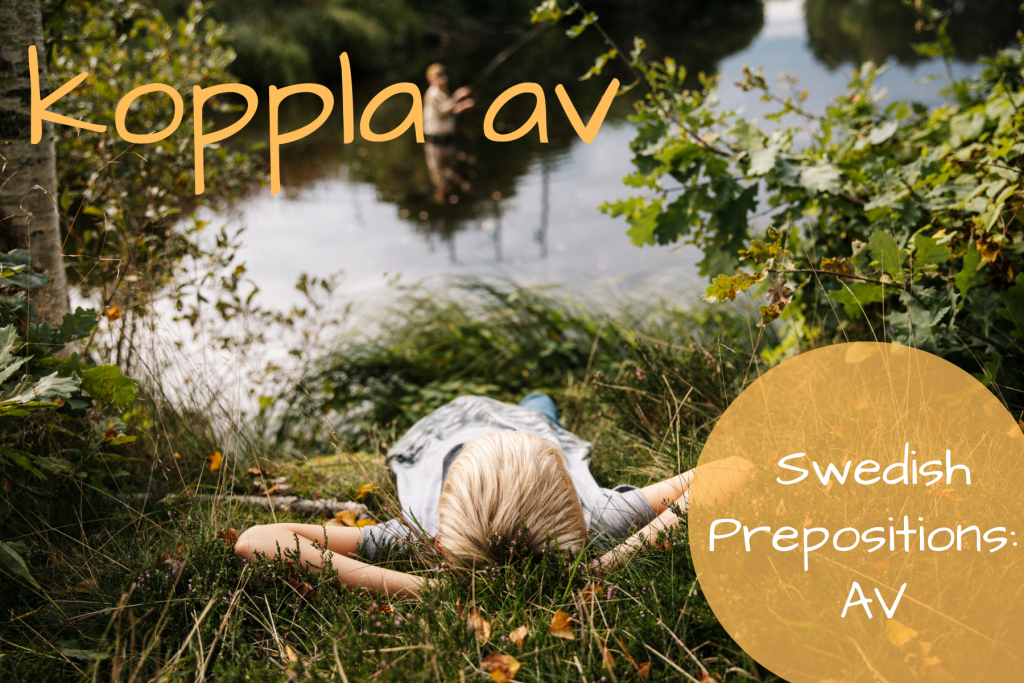Of, By, From? The Swedish Preposition “Av” Posted by Chelsea B on May 27, 2020 in Culture, Grammar, Swedish Language, Vocabulary
Prepositions are tricky parts of speech to master. I’ve covered this topic before with i and på, but there are plenty more for us to dissect! Attempting to translate prepositions directly from your native language into Swedish often doesn’t pan out. Sometimes the preposition is the same, sometimes not, sometimes you don’t even need a preposition. Today, we’ll cover the Swedish preposition av, and its various uses.
The best way to master prepositions is to memorize their proper use in your target language, rather than of obsessing over the literal, word for word translation. The Swedish preposition av can mean “by”, “off”, “from,” and “of”, and it may surprise you in its application. For example, In English you may say, “We received the present from Henrik.” English speakers think, “Great! I can use the preposition från here!” You could, but most often “receiving a gift” craves the preposition av.
“We received the present from Henrik,” becomes
“Vi fick presenten av Henrik.”
So again, remember that thinking literally about these translations won’t necessarily help you remember when to use them in Swedish. So it’s best to memorize which contexts are best paired with av.
“of,” when describing a part of a group:
De bor i olika delar av Europa. They live in different parts of Europe
Ett av barnen gillar tomater. One of the children likes tomatoes.
To identify what something is made from:
Skeden är gjord av björk. The spoon is made from birch.
Familjen består av jag och mina barn.
The family is made up of myself and my children.
Used to connect an “agent” in a passive statement:
Mumintrollen är en bok av Tova Jansson. Moomin is a book by Tova Jansson.
De blev förföljda av en bil. They were followed by a car.
To identify the source of something:
av gläde out of joy or from joy
Pojken skrattade av glädje när han fick se sin vän.
The boy laughed of joy when he got to see his friend.
When paired with an adjective:
intresserad av interested in
-Är du intresserad av hip hop? -Are you interested in hip hop?
-Nej, hip hop är inte min grej. -No, hip hop isn’t my thing.
nog av enough of
Jag har fått nog av dina kommentarer. I’ve had enough of your comments.
Av is also commonly used as a particle to be paired with a verb. I’ll list some examples below but first, a pronunciation tip; when you are using these verbs place emphasis on av when speaking. This pronunciation rule is used with all particle verbs in Swedish.
Verbs with av:
att gå av to step off/ get off
att stänga av to turn off
att slå av to disconnect
att lägga av to stop it/quit it
att koppla av to relax
att slappna av to relax
att klara av to cope, or to manage
att bli av to get rid of
att torka av to dry off
Are there any other prepositions on your list that give you trouble? Which ones? Tell me below!

Build vocabulary, practice pronunciation, and more with Transparent Language Online. Available anytime, anywhere, on any device.





Comments:
Viva:
What a nice blog.
Thank you.
Duncan:
A very useful post, but I’m not sure I understand about the stress on particles: obviously it means as opposed to on the verb (“Han kopplade AV”), but does it also include a following noun where there is one, in other words is it “Hon blev AV skorna” or “Hon blev av SKORNA” ?
Chelsea B:
@Duncan Hej Duncan! Typically, you stress the pronunciation of the preposition only when paired with a verb. BUT, if it is important that you took OFF your shoes, instead of putting them ON, then you could emphasize that as well, just as you might in English.